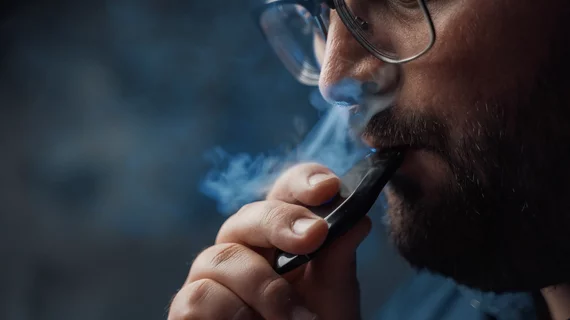Vaping-related deaths climb to 60, including youngest victim yet, as CDC finds strong THC link
The number of deaths from e-cigarette or vaping product use-associated lung injury has climbed to 60 across the U.S., including a 15-year-old teen in Texas, the youngest victim since the epidemic started last year. However, the number of new cases has continued to decline month to month, the Centers for Disease Control reported Friday.
All told, there have been 2,668 instances of EVALI, which has become a pressing issue for radiologists attempting to diagnose and treat this emerging indication. CDC officials added a new diagnostic finding to that toolbox last week, noting a strong connection between THC and EVALI. About 82% of victims reported using the compound, which gives marijuana users their high, in e-cigs or other vaping products, with another 57% saying they’ve used nicotine-containing products.
“Clinicians and public health practitioners should remain vigilant for EVALI cases. CDC recommends that persons not use THC-containing e-cigarette or vaping products, particularly from informal sources,” the agency noted in a report, issued Jan. 17. The same investigation also found that EVALI cases have declined steadily since reaching their peak in September.
A second report from the CDC also confirmed strong linkages between THC use and EVALI in Illinois. However, nine of the 121 individuals interviewed for the study reported zero use of THC products, a finding that requires “further study,” the CDC said.
The agency also published a commentary piece in the New England Journal of Medicine Jan. 17, emphasizing that the EVALI outbreak is separate and distinct from the concerning uptick in vape use among adolescents, which has been building for much longer. EVALI primarily affects those ages 18 to 34 and is driven by THC use. The youth vaping epidemic, meanwhile, affects those 17 and younger, and is fueled by nicotine consumption, the team noted.
“The focus and scope of actions to address these epidemics must be grounded in science and must target the underlying drivers,” wrote the CDC’s Brian King, PhD, and colleagues. In EVALI’s case, those could include “continued investigation of causes, diagnosis and treatment by healthcare providers, public health messages about risks, and ensuring that chemicals of concern are not introduced into the supply chain.”
“It is also critical to monitor any consequences from long-term use of THC in these devices and long-term health outcomes in patients who survive EVALI,” King added.
In an intersection of these two epidemics, public health officials recently reported the death of an unnamed 15-year-old girl from Dallas County, who suffered from a “chronic underlying medical condition” caused by e-cigarettes. She replaces a 17-year-old Bronx teen as the youngest EVALI victim, according to reports.

